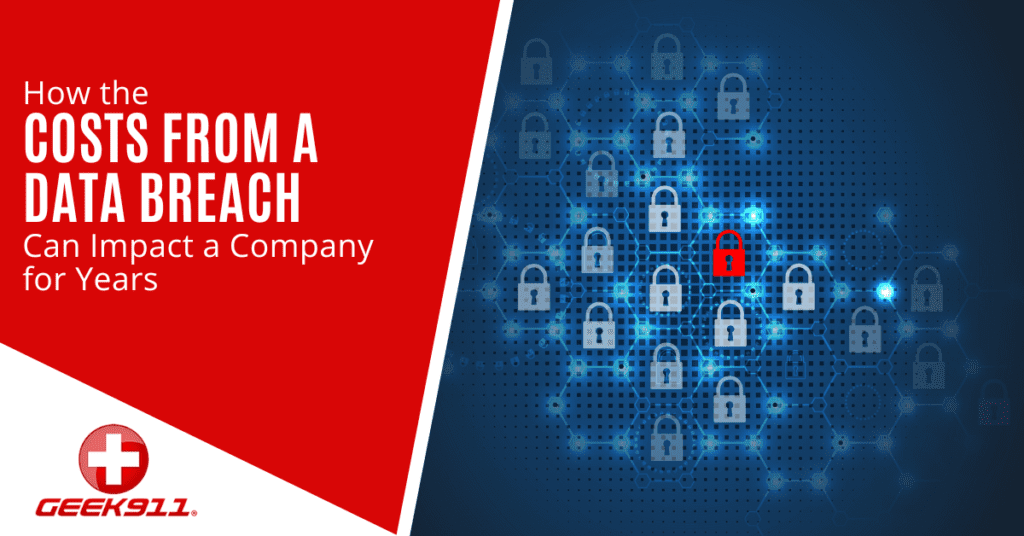How the Costs from a Data Breach Can Impact a Company for Years

In today’s digital age, data breaches have become a prevalent threat to businesses of all sizes and industries. The repercussions of a data breach can extend far beyond the immediate aftermath, impacting a company’s finances, reputation, and long-term viability.
In this article, we will delve into the various ways in which the costs from a data breach can profoundly affect a company for years to come to highlight the importance of investing in cybersecurity.
Understanding the Immediate Costs of a Data Breach
When a data breach occurs, the immediate costs incurred by a company can be significant. These costs typically include:
- Legal Expenses: Companies may face legal fees associated with investigating the breach, complying with data protection regulations, and defending against lawsuits from affected individuals or regulatory bodies.
- Remediation Costs: This includes expenses related to restoring systems, conducting forensic investigations, and implementing security measures to prevent future breaches.
- Notification Expenses: Companies are often required to notify affected individuals and regulatory authorities about the breach, which can involve printing and mailing costs, call center support, and credit monitoring services for affected parties.
- Loss of Revenue: A data breach can lead to a loss of customer trust and business, resulting in decreased revenue in the short term.
These immediate costs can add up quickly and place a significant financial burden on a company.
Long-Term Financial Impacts
The financial repercussions of a data breach can extend far beyond the immediate aftermath. Some of the long-term financial impacts include:
- Reputational Damage: A data breach can tarnish a company’s reputation, leading to a loss of customer trust and loyalty. This can have lasting effects on customer retention and acquisition, ultimately affecting revenue streams in the long term.
- Regulatory Fines and Penalties: Regulatory bodies may impose fines and penalties on companies that fail to adequately protect customer data, especially if the breach resulted from negligence or non-compliance with data protection regulations. These fines can be substantial and may escalate over time if the company fails to address underlying security issues.
- Litigation Costs: Data breach victims may file lawsuits against the company seeking damages for the exposure of their personal information. Defending against these lawsuits can result in significant legal expenses and settlements, further impacting the company’s financial stability.
- Cyber Insurance Premiums: Following a data breach, companies may see an increase in their cyber insurance premiums as insurers perceive them as a higher risk. This can lead to higher ongoing expenses for the company.
These long-term financial impacts can hinder a company’s ability to invest in growth initiatives and innovation, ultimately affecting its competitiveness in the marketplace.
Non-Financial Consequences
In addition to the financial impacts, data breaches can also have non-financial consequences that affect a company’s long-term viability:
- Loss of Customer Trust: Customers are increasingly concerned about the security of their personal information, and a data breach can erode trust in a company’s ability to protect sensitive data. Rebuilding trust with customers can be a challenging and time-consuming process.
- Damage to Brand Reputation: A tarnished reputation resulting from a data breach can have lasting effects on a company’s brand image and value. It may take years for the company to regain the trust and confidence of consumers and stakeholders.
- Employee Morale and Productivity: Data breaches can take a toll on employee morale and productivity as employees may feel demoralized or stressed about the security of their own personal information and that of the company. This can impact employee retention and overall organizational performance.
These non-financial consequences can be just as damaging to a company’s long-term success as the financial impacts.
Avoid Data Breaches
The costs from a data breach can have far-reaching implications for a company, impacting its finances, reputation, and long-term viability. As the threat landscape continues to evolve, it is essential for companies to prioritize cybersecurity measures and invest in robust data protection strategies to mitigate the risks associated with data breaches.
By taking proactive steps to safeguard sensitive information and respond effectively to security incidents, companies can protect themselves from the devastating consequences of a data breach.
Contact us at GEEK911 to learn more about how we can help your company strengthen its cybersecurity defenses and mitigate the risks of data breaches. We are committed to helping businesses protect their sensitive information and maintain the trust of their customers and stakeholders.
